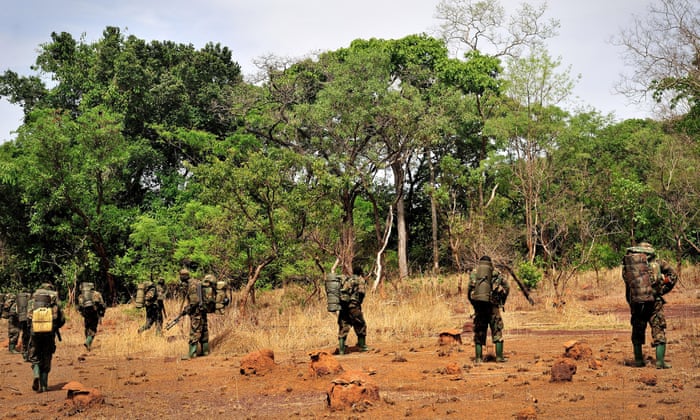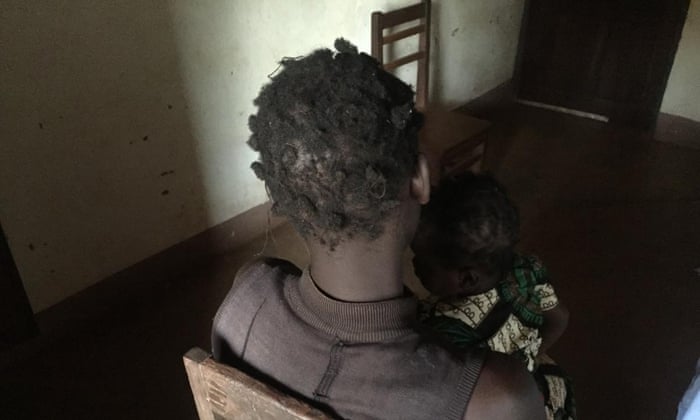A Brief Colonial History Of Ceylon(SriLanka)
Sri Lanka: One Island Two Nations
A Brief Colonial History Of Ceylon(SriLanka)
Sri Lanka: One Island Two Nations
(Full Story)
Search This Blog
Back to 500BC.
==========================
Thiranjala Weerasinghe sj.- One Island Two Nations
?????????????????????????????????????????????????Thursday, June 8, 2017
Ugandan soldiers accused of rape and assault to face court martial
Military
pledges zero tolerance after allegations of abuses by Human Rights
Watch, but some fear court will not bring troops to justice
Ugandan
soldiers on patrol during an operation to find Joseph Kony, leader of
the Lord’s Resistance Army. Photograph: AFP/Getty Images




Women
and girls interviewed by Human Rights Watch – including this woman,
pictured holding her daughter – said they had sex with Ugandan military
personnel in exchange for food or money because displacement due to the
ongoing conflict had left them desperate. Photograph: Lewis Mudge/Human
Rights Watch

Samuel Okiror-Tuesday 6 June 2017
The Ugandan military has launched investigations into allegations of
rape and exploitation by soldiers who have been searching for notorious
rebel group the Lord’s Resistance Army in Central African Republic.
At least two non-commissioned officers are to appear at a court martial
over alleged rapes committed in CAR between 2015 and 2017, the military
said.
Last month, Human Rights Watch accused troops deployed in CAR as
part of the African Union mission to eradicate the LRA of sexually
exploiting or abusing at least 13 women and girls since 2015, including
at least one rape, and of threatening some victims to remain silent.
“[The] Uganda People’s
Defence Force exercise zero tolerance on all acts related to sexual
exploitation and abuse. Directives have been given to investigate those
cases recently reported,” said Uganda’s military spokesman, Richard
Karemire. “We can’t tolerate errant officers. Proper investigations are
being conducted. The culprits will be tried in a court martial and
punished according to our laws.”
Uganda’s 2,500-strong force has been deployed in CAR since 2009 as part
of the AU’s regional taskforce, alongside US special forces, to capture
or kill members of the LRA, in particular its leader, Joseph Kony. But the two armies began withdrawing in April amid claims that the mission to neutralise and degrade the rebel outfit had been achieved, and that the LRA was no longer a threat.
Kony and his dwindling band of armed fighters – now believed to number
around 120 – remain spread across remote areas of CAR, South Sudan, and
the Democratic Republic of Congo.
For its report, in early 2017 HRW interviewed 13 women and three girls,
who described exploitation or abuse since 2010 by Ugandan soldiers in
the south-eastern town of Obo, CAR, where Ugandan forces were based.
They also heard credible accounts of other cases. Two of the women were
children when the alleged abuses took place, HRW said.
“The allegations by HRW are both shocking and disturbing. The Ugandan
military should do all it can to bring the errant officers to justice.
The UPDF needs to take these allegations seriously and punish the errant
officers if found guilty,” said Lino Ogora, director of the Foundation
for Justice and Development Initiatives, based in the northern Ugandan
city of Gulu.
“As a person who has worked with victims of sexual violence before, I
understand the pain that the victims in CAR are going through and it is
my hope that the UPDF will do justice for the victims.”
But Ogora also attacked the failure to undertake a proper investigatation of exploitation within local communities.
Alix Boucher, assistant research fellow at the Africa Center for Strategic Studies in Washington, said the UPDF was taking the cases seriously.
“It has repeatedly done so in the case of such allegations, both in the
context of UN peacekeeping missions and when soldiers have misbehaved at
home. The UPDF court martial system is known for being swift and
effective. The UPDF also makes these decisions and any ensuing
punishment public. Punishment has ranged from demotion and dismissal to
execution in the most serious cases,” Boucher said.
“President [Yoweri] Museveni … believes UPDF participation in
peacekeeping is prestigious and wouldn’t want this to taint [its]
reputation,” she said.
Maria Burnett, associate director of HRW, said: “The UPDF commitments to
investigate need to bear fruit – to lead to accountability and redress
for victims – to have any impact on the situation. Often, the Ugandan
police and military commit to investigate when the media inquires, but
then they do little to follow through. A climate of impunity could lead
to continued abuses in future areas of deployment, so meaningful action,
beyond public relations, will be required.
“The Ugandan army – like all militaries – need to hold commanders and
their troops accountable for their conduct, whether they are deployed in
CAR, Somalia, Uganda or elsewhere. Ensuring victims can report, and
ensuring that military courts are providing fair trials for soldiers
accused of abuses are critical steps to accountability.”
Nevertheless, some experts believe the investigation is no more than lip service to gain international approval.
“The Ugandan military takes seriously its image in both peacekeeping
operations and foreign war theatres. They are willing to announce an
investigation into allegations of crimes in those operations while
stonewalling a call for the same for allegations of crimes in the
country,” said Nicholas Opiyo, a human rights lawyer based in Kampala.
“These actions are often less transparent … and the reports of such
investigations almost never made public. Given that history, it is right
to suspect that this round of promised investigations is merely to
placate Uganda from criticism and will amount to minimal, if any,
action.”
Uganda’s military foreign engagements and peacekeeping missions have
been beset by accusations of abuses. In 2016, the UN Office of the High
Commissioner of Human Rights reported 14 cases of rape by Ugandan forces in CAR, including instances involving children.
Phil Clark, an Africa specialist at Soas University of London, said: “At
every turn, the Ugandan military has blocked international
investigations, claiming that it would deal with these cases through the
national military courts. These cases have routinely turned into
whitewashes. In the latest incidents in CAR, the Ugandan military is
once again prosecuting only low- and middle-ranking personnel.
“If these cases follow the historical pattern, these officials will
either be exonerated or found guilty of relatively minor charges and
given very lenient sentences. The chance of justice being delivered in
these very serious cases is next to zero.”
One rape survivor, 15-year-old “Marie”, said a Ugandan soldier had
assaulted her in January 2016, while she was working in the fields near
the Ugandan base at the Obo airstrip. “The man was alone … I could not
understand what he was saying,” she said. “He pushed me to the ground.
Afterwards, there was real pain.” She became pregnant from the rape and
had a child.
Several countries providing troops for UN peacekeeping
missions have faced allegations of soldiers engaging in rape and
exploitation, which remain unresolved. The former UN secretary-general
Ban Ki-moon recommended that accused soldiers be court martialled in the countries where the alleged crimes take place.
Boucher, from the Africa Center for Strategic Studies, said: “It is very
difficult to end sexual exploitation and abuse in any kind of military
operation, even peacekeeping. The UN has instituted a zero-tolerance
policy and normally sends military units home so allegations can be
investigated. But it is up to the member state to prosecute. Uganda’s
authorities have repeatedly done so. This is very positive.”

